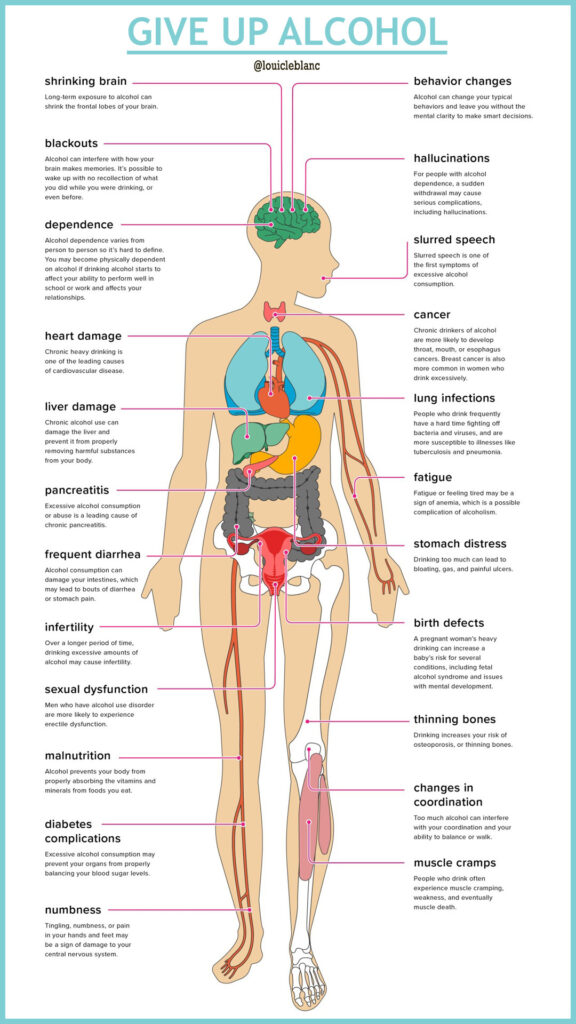I simply don’t understand why we continue to consume alcohol. With all of the available research available, why does one consume it?
….
For the digestive and endocrine glands, alcohol causes an abnormal activation of digestive enzymes that’s produced by the pancreas and the build-up of these enzymes can lead to inflammation known as pancreatitis. Pancreatitis can become a long-term condition and cause serious complications.
….
For the liver, we know that it’s an organ which helps break down and remove harmful substances from your body, including alcohol, but long-term alcohol use will greatly interfere with this process. Excessive alcohol consumption leads to an accumulation of fat in the liver, which causes inflammation and results in liver scarring and, eventually, liver failure. Alcohol consumption may also play a role in pancreatic cancer, which is the most lethal forms of cancer with just six percent of patients surviving five years after diagnosis.
….
For your blood sugar levels which need to be effectively managed and balanced, alcohol creates greater complication on this with side effects related to diabetes. The pancreas helps regulate your body’s insulin use and response to glucose. When your pancreas and liver aren’t functioning properly, you run the risk of experiencing low blood sugar or hypoglycemia. A damaged pancreas may also prevent the body from producing enough insulin to utilize sugar. This can lead to hyperglycemia or too much sugar in the blood.
….
For the central nervous system, the damage varies and is one of the easiest ways to understand alcohol’s negative impact on your body. Slurred speech is one of the first signs you’ve had too much alcohol since it reduces communication between your brain and your body. This makes coordination more difficult, which will lead to a hard time maintaining balance. You should never drive after drinking.
….
Due to the damage caused on your central nervous system, you may experience numbness and tingling sensations in your feet and hands. Drinking alcohol also makes it difficult for your brain to create long-term memories and reduces your ability to think clearly and make rational choices. Over time, frontal lobe damage can occur, which is the area of the brain that’s responsible for emotional control, short-term memory and judgement on top of other vital roles. Lastly, chronic and severe alcohol abuse can also cause permanent brain damage.
….
For the digestive system, the connection between alcohol consumption and your digestive system might not seem immediately clear as the side effects often only appear after there has been damage. And the more you drink alcohol, the greater the damage will become. Alcohol can damage the tissues in your digestive tract and prevent your intestines from digesting food and absorbing nutrients and vitamins. As a result, malnutrition occurs and leads to gassiness, bloating, a feeling of fullness in your abdomen as well as diarrhea or painful stools.
….
For the circulatory system, alcohol affects your heart and lungs. People who are chronic drinkers of alcohol have a higher risk of heart-related issues than people who do not drink. Women who drink are more likely to develop heart disease than men who drink.
….
For sexual and reproductive health, one may think drinking alcohol can lower your inhibitions and help you have more fun in bed. But the reality is quite different. Men who drink too much are more likely to experience erectile dysfunction. Heavy drinking can also prevent sex hormone production and lower your libido. Women who drink too much may stop menstruating. That puts them at a greater risk for infertility. Women who drink heavily during pregnancy have a higher risk of premature delivery, miscarriage or stillbirth.
….
For the skeletal and muscle systems, long-term alcohol use may prevent your body from keeping your bones strong. This habit may cause thinner bones and increase your risk for fractures if you fall. And factures may heal more slowly.
….
For the immune system, drinking alcohol heavily reduces your body’s natural immune system. This makes it more difficult for your body to fight off invading germs and viruses. Over a long period of time, heavy alcohol drinkers are also more likely to develop pneumonia or tuberculosis than the general population. About 10 percent of all tuberculosis cases worldwide can be tied to alcohol consumption. Drinking alcohol also increases your risk for several types of cancer including but not limited to: mouth, breast and colon.
….
Alcohol has a devious dependency as heavy drinkers will develop a physical and emotional dependency on alcohol. Alcohol withdrawal can be difficult and life-threatening. You often need professional help to break an alcohol addiction. As a result, many people seek medical detoxification to obtain sobriety.
….
I cannot surmise how fantastic it is to give up alcohol completely on all levels over the last 10+ years. The health, mental, spiritual and financial benefits out way any of the advantage that alcohol consumers claim. Not only do you remain young-looking, healthy, active and agile but you have very little excess fat on your body and you never have to worry about hangovers interfering with your plans.




